- Home
- Courtney Cole
Saving Beck Page 3
Saving Beck Read online
Page 3
“Oh my God, Mom. He’s bleeding so much. What do I do?”
He was screaming, and I was trying to comprehend, to make sense out of his words.
“Your dad?” My words were a rush. “Who, Beck? Where are you?”
There was a muffled noise from the background and I was saying his name. He didn’t even hear me.
“I think he’s dead,” he said instead, and he was moaning. “Oh my God, oh my God. What do I do?” More muffled noises, a cracking. “Dad, open your eyes. You’re okay, you’re okay. Talk to me. Open your eyes. Jesus, Mom. What do I do?”
“Is your father breathing?” I managed to ask, and my chest was very, very tight, adrenaline spiking everywhere.
“No. Oh my God.”
“Stay calm, Beck,” I instructed, fighting my own panic as I tried to remember what to do. “Feel for the bottom of his sternum with your fingers. Keep your elbows locked and press on that spot. Measure two fingers in, interlock your hands, and start beating his heart for him with the heel of your hand. Beck, are you hearing me?”
“Yes. I might have to put the phone down.”
“Put it on speaker. Have you called an ambulance?”
“I don’t know where we are. On the highway somewhere.”
“Did the car’s emergency system talk to you?”
“Yes. It said help was on the way.”
“Okay, good. Is your dad talking?”
“No. Mom, he’s dead. Jesus, he’s dead. His bones are . . . I can hear his bones.”
“Don’t stop CPR,” I cried out to him, and fear pulsed through every beat of my heart. Please, God, please don’t let this be real. “Don’t stop, Beck.”
“I’m not,” he assured me, and his voice was broken.
“Are you okay? What happened?” I was trying to make sense of it all with my sleep-addled brain.
“I’m not okay. But I’m better than Dad. Jesus, I’m sorry, Mom. This isn’t working. It isn’t working.”
“Don’t stop,” I instructed him with a shaky breath.
“Dad, I love you. Please breathe. Please breathe. Dad, please,” Beck begged, and his voice cracked and I was helpless. They were there, and I was here, and there was nothing I could do.
“Tell him I love him,” I practically shouted as I heard a siren in the distance. “Help is coming, Beck. Hang on.”
“It’s too late, Mom,” my son said wearily. “It’s too late.”
“Don’t say that,” I snapped. “It’s never too late, Beck. He’ll be okay. He’ll be okay.”
But he wasn’t.
When I arrived at the hospital an hour later, I found out he wasn’t. I screamed, collapsed, and threw up.
Then I sat beside the love of my life and said goodbye, stroking his hair out of his broken face, my hands bloody from his skin.
“I love you,” I whispered. “I love you. Don’t leave me.”
But he did.
four
BECK
MERCY HOSPITAL
3:12 A.M.
I MUST’VE DRIFTED AWAY FOR A minute, because all of a sudden I’m awake but I don’t know where I am. I have to listen again, and there are voices.
My mom is here. I hear her talking, but it’s like it’s through a tube and my ears are stopped up. I can’t understand what she’s saying; all I know is that I’m not ten years old anymore. I don’t know how I know it—I just do. I also know that I’ve done something terrible, something reprehensible, and I wonder if I’m better off not remembering.
I listen to the muted noise for a while, just soaking it in. I can’t see my mother, but I know she’s here. That’s enough.
I try to move, to say something to her, to apologize for being here, but I can’t. I’m still frozen, still too heavy. I’m concrete, I’m rocks. Why won’t my brain work right? My thoughts are like mud, slow to move and thick like sludge.
There is a ringing, accompanied by a buzz. Slowly, I realize it is my mother’s cell phone. Her voice is low and hushed as she greets someone, and I focus hard, hard, harder, and something clicks into place, like the gears of a clock, and I finally understand the words.
“How are the kids?” she asks.
“They’re fine,” a female voice answers, and the room is so quiet that I can hear through the phone. “Don’t worry. How is Beck?”
The voice . . . I know it but I can’t place it. Like everything else in my head right now, it’s a puzzle and the pieces don’t fit.
“Sam . . . he’s . . .” Mom touches my hand. I try to squeeze her fingers, but my hand won’t move. It’s like my appendages are broken, only I don’t feel any pain.
Sam. Sam. My aunt. I picture her face. She looks like my mom, only younger.
“Nat, tell me,” Sam says, and she’s scared. I hear it in her voice.
“He suffered a stroke,” Mom answers. Is she talking about me? That’s impossible. Strokes are for old people. That’s when they can’t talk anymore, and their mouths droop on one side of their face. That’s not what’s wrong with me. Is it?
Internally, I wrench around, trying to thrash, trying to fight, but my body is a prison and I can’t break free.
Help! I think, as loud as I can. God, Mom, help me!
But no words come, and she doesn’t know I can hear her. “The doctors don’t know how extensive,” my mom says, her words laced with so much pain. I did that. I can taste the guilt in my mouth.
“He’s strong,” Sam tells her, and I love her for saying that. I am strong. Or I was. Whatever is wrong with me, I’ll fight it. I wish I could tell my mother that.
A chair scoots across the floor and the legs grate on the tile.
“I need you to remember something,” Sam says, and I strain to hear. She’s talking so low and everything sort of sounds like I’m underwater. “This is not your fault. You did everything you could to help him, Natalie. You tried, you fought. But in the end, it was his decision to make. He had to get help. You couldn’t make him. No one could.”
“You don’t understand,” my mom almost whimpers. “When I see Beck in my head, I don’t see the person he is now. I don’t even see the person he was a year ago. I see the boy he used to be, the one with the sticky chin and red Kool-Aid mustache. It’s not his fault either, Sam. He was forced to deal with a situation that even adults can’t deal with sometimes. He’s a good boy. This is all . . . this is all just wrong. I should’ve tried harder. I fell apart, and you know it.”
She’s crying now, and a pang nails me in the gut. I’ve hurt her. She’s the only one who loves me no matter what, and I hurt her.
“Natalie.” Aunt Sam is calm. “You love your son. You’ve always loved him. What you need to do now is focus on your inner strength. The thing that got you through the entire past year, the thing that keeps you going every day. You’re strong too. You’ve got to use that strength now.”
“What if he dies?” my mom asks, her voice paper-thin, and I want to scream at her. No, I won’t die. I won’t. I won’t do that to you.
But I can’t promise that. My head feels funny, like rock or wood. It’s foreign to me, like something that isn’t mine. Is this what it’s like to die? Am I dying?
“Don’t think that,” Sam answers, and she’s so confident that even I almost believe her. “They’re doing everything they can medically do. He has to do the rest, and I think he will. He has fire in him, Natalie.”
“That’s the problem,” Mom answers. “That fire. It was anger that ate him up. It’s anger that made him run, and anger that put him here now. It might destroy him, Sam. We tried to contain it. We tried—you know we tried.”
She’s crying again, and Sam is murmuring in soothing tones, in words I don’t understand and can’t really hear.
But what she said . . . I focus on that.
I have fire in me. Anger.
That’s definitely true.
It burned and burned, and maybe Mom is right. Maybe it’s just gonna burn me up.
But what am I so a
ngry about? Why did I run?
I’m muddled again. But then pieces come flooding back, and I grab more of them so I can make them fit, so that something, anything, makes sense. Life isn’t what it once was. I do know that.
* * *
I STAYED IN THE weight room for hours after school. Our coach was relentless about staying in shape during the off-season. When I finally collapsed into my car, drenched in sweat, I almost didn’t have the energy to drive home. I was starving and thirsty but didn’t even have enough in me to stop at a drive-thru. All I wanted was my bed.
When I trudged up the driveway to my door, my bag slung over my shoulder, I noticed mom’s car parked in front of the garage. Good, she was home. Hopefully she’d cooked something.
When I opened the door, though, I wasn’t met with the smells of dinner.
I didn’t know why I was surprised. She hadn’t cooked in a while. I guessed I was just hoping.
The house was quiet too. Too quiet.
“Devin?” I called for my little brother as I dropped my bag on the floor inside the door. “Anna-B?”
No answer.
I poked my head into the dining room where I found Devin at the table, his schoolbooks in front of him. He looked up, his glasses off-kilter. He shoved them up his nose to straighten them.
“Hey, Beck,” he said, greeting me.
“Where’s Mom?” I asked. He looked away.
“In bed.”
Again. Son of a bitch.
“Have you eaten?” I asked, and my muscles were so tried they were shaking.
Dev shook his head.
Damn it.
“Okay. Where’s Anna?”
“She was in her room playing with her Barbies last time I checked.”
“I’ll find something in the kitchen to eat. Can you go get her?”
I was resentful as I yanked open the fridge and looked inside. There was nothing in there but orange juice, and I was pretty sure it was expired.
My mother should be doing this. I got it—she was sad. We were all sad. My dad had been dead for six months, though, and Jesus Christ. I was there when he died, and you didn’t see me lying in bed every chance I got.
But that’s what she did. Every damn day.
She did the bare minimum around the house and stayed in her darkened bedroom as often as she could. It was getting fucking old.
I grabbed two frozen pizzas from the freezer and punched buttons on the oven.
Annabelle burst into the kitchen and grabbed me around the waist. “Beck!” she sighed into my sweaty shorts.
Her hair was tangled, and I wondered if she’d gone to school like that.
“You hungry?” I asked. She nodded, releasing me.
“I’m soooo hungry, Becky.”
“I’m making pizza.”
She grinned happily, because she’d eat pizza for every meal if we let her.
“Go wash up,” I added. She trotted away to the nearest bathroom, and the phone rang.
I grabbed it.
“Hello?”
“Beckitt,” my aunt Sam said. “Why haven’t you been answering your cell phone?”
“I was at football,” I told her, sliding the pizzas into the oven and holding the phone under my chin. “Why? Is something wrong?”
Pause.
“No,” she answered after a moment. “I just couldn’t get ahold of your mom, so I thought I’d try your number.”
“She’s in bed.” I tossed the empty boxes in the trash and ran a sponge under the water so I could wash off the table. “Again.”
Another pause.
“Do you want me to come over?”
“No, I’ve got it. I’m making frozen pizza for dinner. That’s all we have.”
I tried hard to keep the resentment out of my voice, but she heard it.
“I’ll go grocery shopping tomorrow,” she promised. “I’ll get all kinds of stuff. Don’t worry.”
“Are you going to make her cook it?” I asked next, and I regretted it as soon as the words left my mouth.
“She can’t help it,” Aunt Sammy reminded me. “She’s depressed, Beck. She’s trying.”
But she wasn’t. That was the problem.
“I’ve gotta go,” I told her. “I’ve got to make sure Dev and Anna get their homework done, and then I’ve got to make sure they’re bathed before they go to bed. You know, because Mom is sad.”
A third long pause.
“It’s going to be all right, Beck,” my aunt told me, although she didn’t sound so sure.
“Okay.”
We hung up, and the kids and I ate. I listened to them talk about their days, even though the only thing I wanted to do was take a shower and wash off my grime.
“Go take baths,” I told them once they’d each eaten three pieces of pizza. They bounced up the stairs, and I put the dishes into the dishwasher.
This isn’t my job, I thought to myself. And it pissed me off.
When I went up to check on the kids before I took my own shower, I poked my head into my mother’s room.
She was curled on top of the covers, fully dressed and fast asleep. She had bags under her eyes. I could see them from here. She looked vulnerable, and against my will, my anger at her slipped away.
She was in this situation because of me in the first place.
I tiptoed in and grabbed a blanket from the foot of the bed, pulling it over her. She didn’t stir. As I turned to leave, I noticed a pill bottle on her nightstand.
I picked it up to read the label.
Natalie Kingsley, Xanax.
Stunned, I stared at the words. She was taking Xanax? I had no idea.
I unscrewed the top and put a few in my pocket. If it helped her, it might help me too. I was miserable too; the difference was I hid it better. I slipped back out so I could check on the kids.
I had to get up at four a.m. to go to the gym if I had any hope of getting that scholarship from Notre Dame, if I even still wanted it. After everything, I didn’t know anymore. Plus, if I went away to college, how would my mom stay afloat here? I didn’t know. I didn’t know much of anything anymore.
five
NATALIE
MERCY HOSPITAL
3:42 A.M.
MY HANDS ARE SHAKING.
The doctor checking on Beck notices the same time I do as I reach over to touch Beck’s face. My fingers convulse and my nail grazes his cheek. I snatch my hand back, gripping it with my other one.
“Take a deep breath, Natalie,” he instructs in an efficient, yet sympathetic voice. My eyelashes flutter closed, and I do. I inhale deeply, then push all of my breath out of my lungs, like I’m breathing through a straw. When I’ve done that a few times, I look at my hand again.
It’s still shaking, and with a sigh, I reach for my purse, fishing out the Xanax bottle. I’d never taken anything in my life until Matt died. But then everything changed. God. My head falls back against my chair, the lousy pink vinyl chair, and I stretch my legs out in front of me. They’re falling asleep and I shake the pins and needles from them.
One pill won’t do it. Two would do it under normal circumstances, but tonight . . . no way.
Three it is.
The doctor raises one eyebrow in a silent question, peering over the edge of his clipboard.
“Don’t judge me,” I tell him. “My son could die. I’m entitled to whatever I need to get through this night.” I don’t have to mention just how much Xanax I’ve taken this past year.
He shakes his head, puts the chart down, and checks Beck’s pupils, lifting up one eyelid, then the other.
“I wasn’t judging,” he answers, and his voice is calm. “I just wanted to make sure you have everything you need. This is a difficult time, I know. Are you having trouble breathing?”
I assess myself, taking a big breath in.
“Not right now. My chest feels tight, though. Heavy.”
He nods. “I want you to sit up straight, and don’t worry so much about breathing d
eeply in, but focus on blowing out. Pretend your lungs are deflating balloons.”
I do that, following his instructions. I close my eyes and envision my lungs being two bright red balloons. In my head, I watch them empty until they are limp, their rubbery sides clinging to each other.
“Good,” he tells me. “The more deeply you can breathe, the less constricted your chest will feel. Often when a person is anxious, they forget to breathe.”
“Thank you,” I say simply. He finishes his examination of Beck.
“Is there any change?” I ask him.
“Not yet. But he’s not worse. So that’s good news right now.”
“I’ll take what I can get.”
He nods, and pauses at the door.
“If you need anything, page me. My number is on the table.” He gestures, and I see the paper—I didn’t even notice him writing it down. I must be seriously out of it.
“Thank you.”
He’s gone and I’m alone with Beck again.
My son’s face is tranquil from the drug-induced coma, and to look at him you’d never know that he’s fighting for his life. The machines beep and breathe and monitor, and Beck just lies there, so calm, so peaceful.
For a minute, I wonder if this is what he would prefer. To slip away from all of this ugly pain, to go in his sleep and to never have to worry again.
I shake my head hard. No. I lean forward and hold his hand.
“What you don’t realize is that you can get past this,” I tell him. “All of this pain . . . it’s temporary. You just have to make it through this part, and then it’s smooth sailing for the rest of your life. You’ll get past the grieving, and one of these days, you’ll think about your dad and you’ll smile, not cry. I swear.”
At least, that’s what they tell me.
The clock on the wall ticks the seconds relentlessly.
The first twenty-four hours, the doctor had said. It’s so short a time to determine someone’s life.
What if he doesn’t have enough time to fight?
I grip Beck’s hand, and it’s icy cold. I rub it, trying to get some life into it, but his fingers stay curled and limp.
“Can you squeeze my hand, baby?” I ask, and I’m practically pleading. “If you hear me, squeeze my hand. Even just a little.”

 Dante’s Girl
Dante’s Girl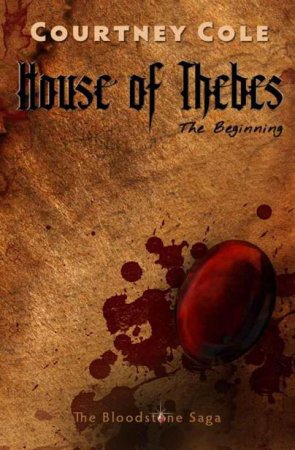 House of Thebes: The Beginning
House of Thebes: The Beginning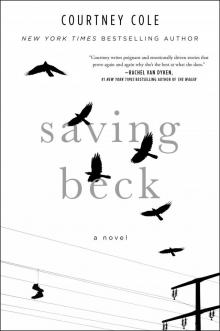 Saving Beck
Saving Beck Nocte
Nocte If You Leave
If You Leave Mia's Heart
Mia's Heart Before We Fall
Before We Fall If You Stay
If You Stay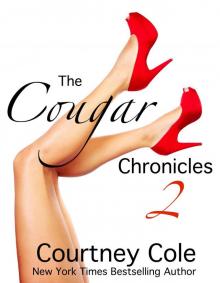 The Cougar Chronicles 2
The Cougar Chronicles 2 Dare Me
Dare Me Soul Kissed
Soul Kissed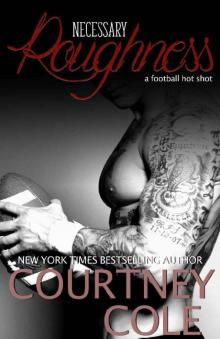 Necessary Roughness
Necessary Roughness Fated
Fated My Peace
My Peace Until We Fly
Until We Fly Every Last Kiss
Every Last Kiss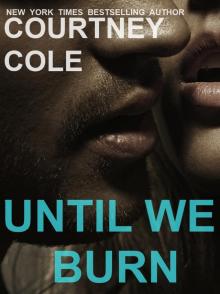 Until We Burn
Until We Burn My Tattered Bonds
My Tattered Bonds Soul Bound
Soul Bound Verum
Verum Initium
Initium With My Last Breath
With My Last Breath Princess
Princess One Size Fits All
One Size Fits All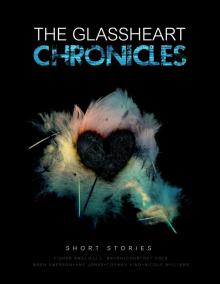 The Glassheart Chronicles
The Glassheart Chronicles Confessions of an Alli Cat
Confessions of an Alli Cat Of Blood and Bone (The Minaldi Legacy)
Of Blood and Bone (The Minaldi Legacy) Initium (Nocte Trilogy (2.5))
Initium (Nocte Trilogy (2.5)) My Peace (Beautifully Broken #5)
My Peace (Beautifully Broken #5) If You Leave: The Beautifully Broken Series: Book 2
If You Leave: The Beautifully Broken Series: Book 2 My Peace (The Beautifully Broken series Book 5)
My Peace (The Beautifully Broken series Book 5)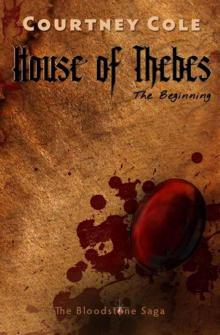 House of Thebes
House of Thebes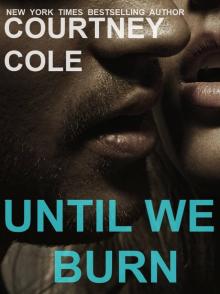 Until We Burn (Beautifully Broken)
Until We Burn (Beautifully Broken) Princess (The American Princess Series)
Princess (The American Princess Series)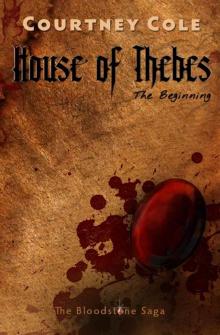 House of Thebes (The Bloodstone Saga)
House of Thebes (The Bloodstone Saga)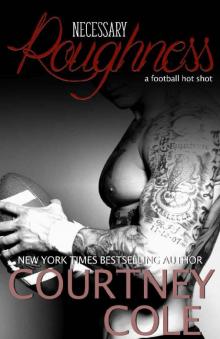 Necessary Roughness (HotShots Book 1)
Necessary Roughness (HotShots Book 1) Until We Fly (The Beautifully Broken)
Until We Fly (The Beautifully Broken) Dante's Girl (The Paradise Diaries)
Dante's Girl (The Paradise Diaries) The Minaldi Legacy
The Minaldi Legacy Dare Me: A Nocte Hotshot Novella
Dare Me: A Nocte Hotshot Novella Every Last Kiss, Final Copy, June 30, 2011
Every Last Kiss, Final Copy, June 30, 2011 Mia's Heart (The Paradise Diaries)
Mia's Heart (The Paradise Diaries)